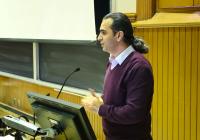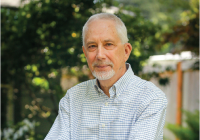
Recent News

Ramin Jabbarli, a PhD candidate in Sociology at the University of Washington and Director of the Foundation for the Inclusive Society, participated as a panelist in a discussion on language and politics in Iran at the University of Toronto, the Ipek Center organized the event. In his presentation, he examined how language-based inequality and exclusionary linguistic policies have…

Graduate sociology student Adam Visokay, along with a group of his peers at the University of Washington*, have investigated how the recency and frequency of GSV street-level imagery correlates with socioeconomic conditions at the neighborhood level in their recent publication Street View for Whom? An Initial Examination of Google Street View’s Urban Coverage and Socioeconomic Indicators in…

While February might be just 28 days, the UW College of Arts & Sciences offers an exciting lineup of more than 40 in-person and online events. From thought-provoking art and music to conversations on culture, history, and science, the UW community invites you to explore, learn, and connect across disciplines throughout the University.
Featured
on UW News

The University of Washington Department of Sociology is pleased to host Jack Goldstone, the Virginia E and John T. Hazel Jr. Professor of Public Policy at George Mason University and a Senior Fellow of the Mercatus Center, to join us for a SocSEM event on Thursday, February 12, 2026 at 12:30 pm, in Savery Hall room 409.Goldstone will focus on the seriousness of an aging…

Courtney Boen, Assistant Professor of Sociology and Faculty Affiliate in the Population Studies and Training Center at Brown University will be on campus on Thursday, January 15 to present at a SocSEM event from 12:30 am-2:00 pm in Savery Hall room 409. Her talk is entitled State Violence & Population Health: The Case of Three Strikes Laws & Racialized Patterns of…

Ten years ago the world met in France to agree to the landmark Paris Agreement a global commitment signed by almost 300 nations to ward off catastrophic climate change. Adrian Raftery, professor emeritus of statistics and of sociology, is quoted.Featured
on TIME

The University of Washington Department of Sociology is saddened to announce the recent death of highly esteemed colleague Stewart E. Tolnay, the S. Frank Miyamoto Emeritus Professor of Sociology, and chair of the department from 2003 to 2008. Stew Tolnay was recognized as one of the preeminent experts in historical demography and made substantial contributions to the study of…

As King County officials work through the budget process, they are engaged in deciding the future of a restorative justice program diverting youth from the criminal legal system. Sarah Cusworth Walker, research professor of psychiatry and behavioral sciences in the UW School of Medicine and Katherine Beckett, professor of sociology and of law, societies and justice at the UW, are quoted.Featured…

A decade ago, nearly every country in the world adopted the Paris Agreement, which aims to limit the rise in global warming to well below 2 degrees Celsius by 2100. Adrian Raftery, professor emeritus of statistics and of sociology, is interviewed.
Featured
on OPB

FROM UW NEWSOctober 17, 2025The Paris Agreement is working, but not well enough to offset economic growthGillian Dohrn Burning fossil fuels releases greenhouses gasses, which trap heat in the atmosphere, contributing to warming. Many nations are cutting emissions by transitioning to renewable sources, such as wind energy, pictured above in Eastern Washington…